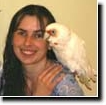BEFORE YOU BUY A BIRD
Kristen Reeves, Meadowlark Farms Avian Supply, Inc.
Please don't do what I did and haphazardly throw yourself into keeping birds! Do a little research, decide what your initial intentions are, and choose a location wisely. The information on this page will give you a little bit of help in making some of these decisions, and making sense of the whole birding process!
You should carefully examine your intentions regarding your birds. Do you want to keep them as pets? Or do you want to breed them, show them, or sell them? If you can make a decision early on, it will save you a lot of time and effort in the long run!
Some things to consider before you buy a bird and/or set up housing:
· Birds can be very long-lived - the average finch lives 10 to 12 years, sometimes - with the best of care - longer! My oldest canary was almost 16, and my African Grey, 46 (which is young). You should seriously consider your commitment before purchasing a bird - or any pet for that matter!
· Birds can be messy - who am I trying to kid? Birds ARE messy! They toss seed around, flutter all over the cage making seed hulls fly all over the place. During the molt, it can often look like it's snowing in the general vicinity of your bird's cage! Some bird poop tends to smell. Not like dog poop smell, but usually a faint odor that someone unaccustomed to it might find offensive. During breeding season, nesting hairs get tossed all over the cage and inevitably fall to the floor and get stuck on furniture like cat or dog hair. Seed hulls from their food dishes are fluffed from the cage as the birds flit around or flutter down to the seed dish. There's no escaping it.
· Birds are dusty - bird feathers create a LOT of dust. Birds preen almost constantly during the day and toss off bits of feather and dead skin in the process. If you, your children, or anyone else in your household has dust allergies, birds might not be the best choice as household companions!
· Birds can be noisy - boy oh boy can they be noisy! Goulds aren't nearly as noisy as some other birds (we won't mention any names here!), but they can still disrupt your Saturday sleep-ins! Birds wake early in the morning and begin to sing after they stretch and get their bearings. This is called the aviary period. They also sing at dusk. Listen to the wild birds outside your home. If you pay close attention, you'll notice what sounds like hundreds of birds singing early in the morning just before the sun comes up. At dusk, those same birds say good night to each other with song. When deciding on a location for them, think about whether they will interrupt your sleep or your daily life. If you don't mind noise, then the location won't really matter! When people come to my house to visit, they are always impressed by the amount of noise and always ask me how I can stand it. I tell them I have a mute button and don't even notice it anymore! Now that my birds have their own room the noise is less obvious, but when the birds are feeling especially fine, we can still hear them quite clearly through the floorboards!
· Birds require daily attention - do you have the time and are you willing to give your birds the daily care they need? While finches don't require the one-on-one attention of a parrot, they still need you to observe them daily, clean their cage, replace their food and water, and pay attention! If you are a very busy person and rarely home, birds are probably not the right companion for you!
· Birds can be smelly - wet feathers smell somewhat like wet dog, and since birds are happier with daily bath water, it is a smell you should be aware of. The foods they eat may smell fishy or funny depending on the type of foods they are consuming. Birds that sleep in nests all night, or hens during breeding season, sit for hours and all night without leaving the nest. Under normal circumstances, bird poop should have NO smell. But during breeding season when they finally do leave the nest to eat, drink, and relieve themselves, that which went in so many hours ago has to come out...and peeee-oooopy! Whew! Hubby and the dog can't touch this one! Those birds have them both beat! A brooding hen's droppings can be as much as 4 times the size of a regular dropping, and because it's been cooped up inside that little bird for so long, it smells pretty bad! In the nromal course of keeping birds, cage papers should be changed regularly - weekly minimum, but more often if you don't like "smells". Sifting the bedding or changing the cage papers daily can help minimize smells from breeding birds, but until the chicks are nearly out of the nest, the smell will be there. It's a different smell from non-breeding birds, but it's still there! If cages are kept clean, there should be NO smell other than warm seed or the occasional dried supplement (herbs, egg food, etc.)
· Bird food can be smelly - for instance, when I sell my birds, I often give the client a zipper bag full of the mixes my birds are accustomed to. I have had clients return their birds to me along with all of the seed and supplements stating they just couldn't take the smell. If you have a very sensitive nose, chances are you might find the smells associated with bird foods offensive. In the case of my clients, you must understand that my Pro-Mix contains ocean products to give the birds a high protein supplement without breaking the bank! My Breed, Beak & Feather Tweak and Gould-Granules also contain ocean products. A lot of fish smell going on there! If you use my mixes, they will smell just a bit like fish - don't panic! I call that the smell of success!
· Finches, under normal circumstances, do not like to be handled - unlike a parrot, parakeet or the occasional canary, finches are not birds to be handled or finger trained. If you are looking for a bird that can be trained to interact with you, finches are probably not your best option!
· Is there an Avian Vet nearby - if you are serious about keeping your birds happy and healthy, be sure there is a good Avian Vet in your area and keep the number in a handy spot! Birds often don't show illness until it is nearly too late to save them. You want to be able to get them to the Vet at the first signs of illness! There are many folks out on the Internet who will be more than willing to help you by suggesting possible illnesses and treatments, but DO NOT LISTEN TO THEM! Unless they can take dropping samples, run tests, and handle the bird themselves to check for signs of illness, chances are they will give you information that could actually make your bird sicker! The wrong medication can mean the death of your bird. It is important to have a PROFESSIONAL - an Avian Veterinarian - take a look!
· Do you have a backup plan - is there someone you trust to care for your birds if you are away from home for an extended period of time? It is often impractical to take your birds with you, so be sure you have a caretaker who is capable of handling care and emergency situations while you are away!
Creating a Plan:
If I haven't scared you away from the idea of owning birds, congratulations! You can now figure out exactly what you have in mind for your fine feathered friends! Decide the purpose of your birds - will they be household pets? If so, move on to the next step - choosing a location. If you are considering selling or showing them, please consider the following...
Breeding birds for sale - there are many items you will need to purchase including additional cages and accessories. You may need a heater or a humidifier and thermometer/hygrometer. You may choose to purchase a brooder and hand feeding equipment or any number of items to aid you in successfully breeding and raising your birds
Showing your birds - you will want to join a bird club in your area, or a National bird club that deals in the type of bird - presumably Goulds - you will show. You'll want to familiarize yourself with the standard for your bird type. You'll want to do a bit of research on how the birds are judged and how points are accumulated. You'll also need to purchase a show cage and accessories, and you'll want to attend as many shows as you possibly can to make it a worthwhile venture. Other advice and tips may be found by contacting an expert on the subject or by read my article about showing. I recommend joining the National Finch and Softbill Society. They have chapters or affiliated clubs all over the United States, Europe, Canada and Australia. There are many reputable and experienced folks within the organization who are more than willing to help you! Once you become familiar with what makes a show bird, head to our Showing Birds article to see what needs to be done.
Choosing a Location:
Again, you'll want to decide what purpose your birds will serve. Do you want them to be with your family in the main part of your home? Or will you set up a room specifically for your birds. Will you keep a single pair, or multiple pairs? Will you be breeding them? All of these questions may help you decide on where to keep your birds.
· You will need a safe place - no matter what your intentions, your birds will need to be housed safely away from your other critters such as cats, dogs, and children (yes, I called children critters - I have 4 of my own so I can do that!). If your birds will be in a common area of your home, place them high enough that cats and dogs cannot reach them. Cats have an uncanny way of figuring out how to get into cages. A simple twist tie can keep cage doors secure, but the weight of a cat jumping up on the cage can tip it over and simply terrify or even kill your birds! My cat has been well trained. She knows I ride a broom and will yell and chase her if she goes near the birds. She knows to stay out of my secure bird room if the door is left open, but she still tries to sneak in there once in a while. My finches are just cheeky enough to get themselves killed! They taunt her and she bats at them with near-miss claws. If a bird escapes, it may be doomed. Dogs, even old ones, can muster the will to jump straight up and snap a bird out of the air (of course, cats will do the same). Our dog is well trained and lets the birds sit on him and pick at his fur and whiskers while he naps. However, I never trust him and shoo the bird off and cage it before tragedy can strike. Children, if taught to handle the birds properly from a young age, can be a great asset in caring for them! As long as they know they cannot bang on the cage or stick things through the bars, and that squeezing too tight is definitely out of the question, your birds will become accustomed to their presence in very little time. My four children all know how to clean cages (heh heh!) and handle the birds if they need in-hand care. Even my youngest is very adept at catching them up and holding them properly for inspection. Get 'em young, train 'em right!
· Draft free - you'll want the location to be as draft free as possible. Birds are highly susceptible to sudden drops in temperature and can get sick from frequent drafts. A common cold, if not caught early, can kill your precious babies quickly. Keep 'em warm! If you are comfortable, chances are your birds will be too (as long as you aren't bundled in your heaviest sweater!). Be careful not to place the cage near a register or radiator. Hot air from the furnace or cold from the central air conditioning can make them ill quickly. It also dries their skin out quickly making more dust and causing skin and feather problems!
· Contain the mess - if you are concerned about mess, there are cage wraps that will contain most of the seed and hulls. To minimize fluffed hulls I have placed my food dishes in the center of the cage and clipped them together with a clothespin to keep them in place. This is particularly effective in keeping a goodly portion of the seed and hulls in the cage as long as the birds aren't startled and start flopping about! There are also long feeders with “dividers” that prevent the birds from scattering the seed, but these much be checked daily and hulls removed. The dividers prevent the hulls from being fluffed off as easily. A feeder that may “look” full, may actually be full of nothing but hulls!
· Proper light - depending on the season, your birds will need between 12 and 15 hours of sunlight or appropriate lighting per day. They rely heavily on the sun to direct their breeding and molting efforts - light drives their internal clocks! When the sun is high for long hours, it is time to make a family. When there is less sun, the birds stop breeding and begin their molt. Proper lighting will give you the ability to control when your birds breed and when they don't. If you place your birds near a sunny window, be sure to cover a portion of the cage for shade. Birds overheat quickly and can die from heat exhaustion if left in the sun for too long. Most of my birds are just dumb enough to sit there not moving out of the heat. They will drop from the perch after panting and hanging their wings. Heat stroke can be deadly. Don't let this happen to your birds!
· Watch out for dangers - There are many dangers in your household that you may not even be aware of! Never keep your bird in the kitchen. Fumes from non-stick pans, burned foods, self-cleaning ovens, etc., can be very dangerous to your bird...even lethal! Think of your bird as a young child - climb up on a chair and get down on your hands and knees. Look for things that your bird could get into if they were to escape the cage or are allowed to fly free. Things like open aquariums and fish bowls, open toilet lids, pet water dishes and dishwater are all drowning hazards. Open doors or windows, closets, spaces behind furniture and open basement doors can be places you might not think to look for your bird if he escapes. Household plants can be poisonous to your bird.
· A word of caution - I have read and have had many experienced bird folks tell me that placing a cage so that the birds can see the television is a no-no. In my home there is very little room for being choosy about where one sits, even if you are a bird! I have never personally had any problems with my birds being able to see or hear the television. In fact, if there is music playing or birds singing on the screen, my birds will begin to sing along! I don't know what else to say except to keep it in mind!
So now you have a plan, you've decided you can deal with the issues surrounding bird mess, smell and noise, you've chosen a location and you're ready to rock n' roll! Time to select the bird of your dreams!





